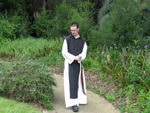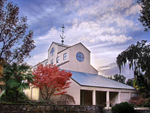|
Brother Dismas' Story

My journey into monastic life is fundamentally a movement away from isolation, depression and despair toward community, right thinking and hope. That means that, generally speaking, I am in a better place now than I was a year ago. It also means that particular elements of this narrative will be a bit dark.
I made a rather large mistake in high school. It was sufficiently grave that suicide proposed itself as a way to deal with it. The only other possible choice, it seemed to me, was to seek the sacrament of reconciliation immediately. I am still breathing because my parish priest, though bleary eyed and dressed in flannel pajamas, was willing to sit with me from midnight till two a.m., hearing my confession.
I have never forgotten the transformative power of absolution that night.
I felt as if Jesus had given me my life back. I knew I didn't deserve it, and that I no longer belonged to myself. I threw myself into living the Catholic tradition: I bought a catechism, read it front to back. I began volunteering at a homeless shelter. I was accepted to the University of Notre Dame and I majored in theology. I wanted to know what a life given to God looked like.
During my senior year, a choir I was involved with sang a concert of sacred music at the maximum security Prison in Michigan City, Indiana. The concert was hosted by the Prison's Catholic community, the Church of St. Dismas. Everyone in the prison was allowed to attend except those on death row.
The concert went well. Afterwards, as we exited the prison we heard a far off voice yell "PRAY FOR ME!" Its owner was an inmate of death row; he had used the day's heat as an excuse to ask that a window be opened.
At the suggestion of one of the choir members, we sang two songs up to his open window. The latter song had words he'd be able to relate to: "Hallelujah, my Father," the song went "for giving us your Son…knowing we would bruise him and smite him from the earth…hallelujah, my Father, his death is my birth…his life is my life." The voice came again: "THANK YOU! PRAY FOR ME!" Everyone in the choir was weeping.
The event stayed with me after I graduated, and through the two years I spent after college, working first as a homeless advocate in Phoenix, Arizona, then as a youth minister in Greensboro, North Carolina.
Depression was one of the consequences of needing to change my life and not knowing how to do it. It wasn't till I'd been in the monastery for two years that I was able to figure that out. Through college, the constant activity and intellectual interaction with the Catholic tradition made it possible not to acknowledge it, but during the first two years after college it came to the fore with a force I could no longer ignore. The only handhold I had during that period came from praying the Liturgy of the Hours, from the occasional consolations of my meager effort at lectio divina, and from a method of prayer known as Centering Prayer, described in the books of Fr. Thomas Keating, a Trappist of St. Benedict's Abbey.
The beginnings of a sense of direction came one night in my apartment, when in prayer all of my life's major conflicts passed in front of me. I remembered how prayer had been the hallmark of getting through them. Usually I would spend a lot of time asking the Lord what I was to do with my life. Suddenly, and with very little fanfare or drama, I knew that I wasn't supposed to pray that my vocation would be revealed to me. Rather, prayer was the vocation, and it had been revealed to me. I decided I would discern with the Trappists. I booked a retreat at Our Lady of Mepkin, the first Trappist house an internet search yielded.
During one of my lengthier stays there, my sense of direction hardened into a trajectory. Going forward meant entering the monastery, struggling every day, giving myself to community and to hope. Going backward meant returning to the world. It meant despair, the ease of isolation. It meant resuming the kind of life that had led me to consider taking my own life. I could not go back. After taking all the psychological tests, I returned to Greensboro and quit my job. I sold my car and I waited. Mepkin accepted me, and I entered on January 24th, 2005.

In the monastery I had to contend with my clay feet, and the alternately cynical and self-exultant patterns of thinking I'd developed to avoid taking responsibility for them. When I'd fall into outright denial, a host of legitimate gripes came up with life in community. I'd blame the brothers, and then wonder why I felt so alone as a Trappist. Watching this happen, over and over, taught me that pride and everything that comes from it was the source of my depression. It would have saved some time if I'd just taken responsibility for my faults and allowed them to become grounds for compassion when the brothers' foibles emerged. Through all of this the brothers were quiet and patient.
One day my struggle became so intense that I decided to pull our brother Edward aside, tell him what I was thinking, and ask his advice. I told Ed about a few things in my past that were haunting me, told him that I could perceive nothing in myself remotely resembling a desire to be a monk. Ed gave me no advice that day. "Dismas," he said, his eyes filling with tears, "Listen. There is no past, there is only now. I don't know why I'm here either." In that conversation he touched, very discreetly, on his own struggles. By the time I left the room, a truth had solidified for me: in this life I don't need to feel fulfilled as much as I need to feel accompanied. When the conversational dust settled, the sense of accompaniment was so deep I decided I could let my desire to be a monk come and go. It was more important to admit that God's call was larger than anything as limited as my own perceived desire. And even when that pinched, I was living with men who knew how that felt.
In the scriptures, I found new ways to understand my life. The Wisdom of Solomon talked about the wicked man as building himself "a prison not made of iron" and it struck me that I'd built myself one of those. I realized that I'd pushed a good number of people away because I feared they'd freak out and bolt as soon as I started being myself. No one in my life had ever done that to me, but I had very often done that to God. God was using the other people in my life, and my own conduct, to show that to me. I had fled from both my pain and the love of others, then whitewashed the maneuver with theological language. Then one night I read a bible passage that changed my life. It's in Acts. Paul and Silas have been beaten and imprisoned, and they're up late into the night praying. The prison's foundations are shaken, everyone's chains fall off and the doors swing open. The ruckus wakes the sleeping guard, who assumes the prisoners have all bolted on his watch. The scripture says "he drew his sword and was about to kill himself…But Paul shouted in a loud voice, 'Do not harm yourself, for we are all here.'" The circumstances were different, but the word of God was describing my life.

Over the years, no one had been obligated to extend themselves for me. But my parish priest had opened his doors in the middle of the night, the brothers bear with my faults and it makes me able to bear with theirs. I'm less quick to call anything I'm going through "depression" these days, no matter how hard things get. Given a dark cloud, whenever two or three remain freely in it, God is there. He may be choosing to leave some of my important desires unfulfilled, but it's so that I'll find happiness in him alone.
In Acts, when the guard asks advice, the Paul and Silas tell him "Believe on the Lord Jesus Christ, and you will be saved." I want to abandon myself to that task, to forget myself completely. God's word tells me what's coming: "[The guard] and his whole household rejoiced that he had become a believer in God." There is no past, only the future. I am looking forward to it.
|



